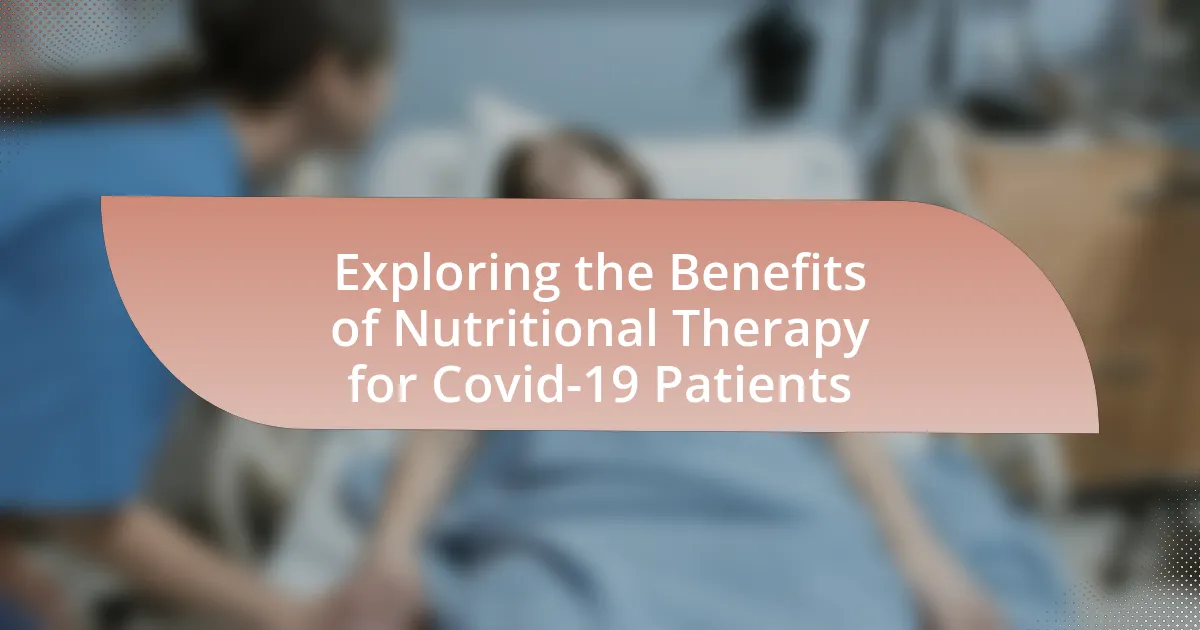Nutritional therapy for Covid-19 patients focuses on dietary interventions that enhance immune function, support recovery, and manage symptoms associated with the virus. Key nutrients such as vitamins C and D, zinc, and omega-3 fatty acids are essential for improving clinical outcomes and reducing inflammation. The article explores how adequate nutrition can mitigate the severity of Covid-19 symptoms, the importance of individualized dietary plans, and the role of meal planning in recovery. Additionally, it addresses the challenges in implementing nutritional therapy and provides practical tips for patients and caregivers to optimize nutritional intake during recovery.

What is Nutritional Therapy for Covid-19 Patients?
Nutritional therapy for Covid-19 patients involves the use of specific dietary interventions to support immune function, enhance recovery, and manage symptoms associated with the virus. This therapy emphasizes the intake of nutrients such as vitamins C and D, zinc, and protein, which are critical for immune health and recovery. Research indicates that adequate nutrition can improve outcomes in Covid-19 patients by reducing inflammation and supporting overall health, as evidenced by studies showing that deficiencies in these nutrients can lead to worse disease progression.
How does Nutritional Therapy support recovery in Covid-19 patients?
Nutritional therapy supports recovery in Covid-19 patients by enhancing immune function and promoting overall health. Specific nutrients, such as vitamins C and D, zinc, and omega-3 fatty acids, play critical roles in immune response and inflammation reduction. Research indicates that adequate nutrition can improve clinical outcomes; for instance, a study published in the Journal of Nutrition found that patients with sufficient vitamin D levels had a lower risk of severe Covid-19 outcomes. Additionally, nutritional therapy can help manage symptoms and complications associated with the virus, thereby facilitating a quicker recovery process.
What specific nutrients are essential for Covid-19 recovery?
Vitamin D, zinc, vitamin C, and omega-3 fatty acids are essential nutrients for Covid-19 recovery. Vitamin D supports immune function and has been linked to reduced severity of respiratory infections. Zinc plays a crucial role in immune response and has been shown to inhibit viral replication. Vitamin C is known for its antioxidant properties and helps in reducing inflammation, which is vital during recovery. Omega-3 fatty acids can modulate inflammatory responses and support overall health. Studies have indicated that adequate levels of these nutrients may improve outcomes in Covid-19 patients, highlighting their importance in nutritional therapy for recovery.
How do these nutrients impact the immune system?
Nutrients significantly enhance the immune system by supporting various physiological functions essential for immune response. For instance, vitamins A, C, D, and E, along with minerals like zinc and selenium, play critical roles in maintaining the integrity of immune cells, promoting their proliferation, and facilitating the production of antibodies. Research indicates that vitamin C is crucial for the function of immune cells, as it enhances their ability to combat pathogens, while vitamin D modulates the immune response and reduces inflammation. Zinc is vital for the development and function of immune cells, and its deficiency can lead to increased susceptibility to infections. These nutrients collectively contribute to a robust immune defense, which is particularly important for individuals, such as Covid-19 patients, who may have compromised immune systems.
Why is Nutritional Therapy important for Covid-19 patients?
Nutritional therapy is important for Covid-19 patients because it supports immune function and aids in recovery. Adequate nutrition can enhance the body’s ability to fight infections, as specific nutrients like vitamins C and D, zinc, and protein play crucial roles in immune response. Research indicates that malnutrition can worsen the severity of Covid-19 symptoms and increase the risk of complications. For instance, a study published in the journal “Clinical Nutrition” found that patients with better nutritional status had improved outcomes and lower mortality rates. Therefore, implementing nutritional therapy can be a vital component in the management and recovery of Covid-19 patients.
What role does nutrition play in managing Covid-19 symptoms?
Nutrition plays a crucial role in managing Covid-19 symptoms by supporting the immune system and promoting recovery. Adequate intake of vitamins and minerals, particularly vitamin C, vitamin D, and zinc, has been shown to enhance immune function and reduce the severity of respiratory infections. For instance, a study published in the Journal of Clinical Medicine found that vitamin D deficiency is associated with increased susceptibility to respiratory infections, including Covid-19. Additionally, proper hydration and balanced nutrition can help alleviate symptoms such as fatigue and weakness, which are common in Covid-19 patients. Therefore, a well-rounded diet can significantly impact the overall health and recovery of individuals affected by Covid-19.
How can nutritional therapy reduce the risk of severe outcomes?
Nutritional therapy can reduce the risk of severe outcomes in COVID-19 patients by enhancing immune function and improving overall health status. Adequate nutrition supports the body’s ability to fight infections, as specific nutrients like vitamins C and D, zinc, and omega-3 fatty acids play crucial roles in immune response. Studies have shown that deficiencies in these nutrients are linked to increased severity of respiratory infections, including COVID-19. For instance, a study published in the journal “Nutrients” found that adequate vitamin D levels are associated with a lower risk of severe COVID-19 outcomes. By addressing nutritional deficiencies and promoting a balanced diet, nutritional therapy can help mitigate the severity of symptoms and improve recovery rates in affected individuals.
What are the key components of an effective Nutritional Therapy plan?
An effective Nutritional Therapy plan includes individualized dietary assessments, specific nutrient recommendations, and ongoing monitoring and adjustments. Individualized dietary assessments evaluate a patient’s unique health status, dietary preferences, and lifestyle factors, ensuring that the plan is tailored to their specific needs. Specific nutrient recommendations focus on essential vitamins, minerals, and macronutrients that support immune function and overall health, particularly important for Covid-19 patients. Ongoing monitoring and adjustments allow for the plan to be modified based on the patient’s progress and any changes in their health status, ensuring optimal outcomes. These components are crucial for enhancing recovery and supporting the immune system during illness.
What types of diets are recommended for Covid-19 patients?
A balanced diet rich in vitamins, minerals, and antioxidants is recommended for Covid-19 patients. Such diets typically include fruits, vegetables, whole grains, lean proteins, and healthy fats, which support immune function and overall health. Research indicates that specific nutrients, such as vitamin C, vitamin D, and zinc, play crucial roles in immune response and may help reduce the severity of respiratory infections. For instance, a study published in the Journal of Nutritional Biochemistry highlights the importance of these nutrients in enhancing immune function and potentially mitigating the effects of viral infections.
How can meal planning enhance nutritional intake during recovery?
Meal planning can enhance nutritional intake during recovery by ensuring that individuals consume balanced meals that meet their specific dietary needs. Structured meal planning allows for the inclusion of essential nutrients, such as proteins, vitamins, and minerals, which are crucial for healing and immune support. Research indicates that adequate protein intake, for instance, is vital for muscle repair and immune function, particularly in recovering Covid-19 patients. A study published in the Journal of Nutrition found that patients with higher protein intake during recovery experienced improved outcomes and faster healing times. By organizing meals in advance, individuals can prioritize nutrient-dense foods, avoid unhealthy options, and maintain consistent eating patterns, all of which contribute to a more effective recovery process.

How can Nutritional Therapy be integrated into Covid-19 treatment plans?
Nutritional therapy can be integrated into Covid-19 treatment plans by focusing on enhancing immune function and supporting recovery through targeted dietary interventions. Specific nutrients such as vitamin C, vitamin D, zinc, and omega-3 fatty acids have been shown to play critical roles in immune response and inflammation reduction, which are essential for managing Covid-19 symptoms and complications. For instance, a study published in the Journal of Nutritional Biochemistry highlighted that adequate levels of vitamin D can reduce the risk of respiratory infections, including Covid-19. Additionally, personalized nutrition plans can be developed to address individual patient needs, ensuring they receive adequate caloric intake and essential nutrients to support their overall health during recovery.
What are the best practices for implementing Nutritional Therapy?
The best practices for implementing Nutritional Therapy include conducting a comprehensive assessment of the patient’s nutritional status, tailoring dietary plans to individual needs, and ensuring ongoing monitoring and adjustments based on patient response. A study published in the Journal of Nutrition in 2021 highlights that personalized nutrition interventions significantly improve health outcomes in patients with chronic conditions, including those recovering from Covid-19. Additionally, integrating nutrient-dense foods that support immune function, such as fruits, vegetables, and whole grains, is essential for enhancing recovery. Regular follow-ups and collaboration with healthcare professionals further optimize the effectiveness of Nutritional Therapy.
How can healthcare providers assess nutritional needs in Covid-19 patients?
Healthcare providers can assess nutritional needs in Covid-19 patients through comprehensive evaluations that include clinical assessments, dietary history, and laboratory tests. Clinical assessments involve evaluating the patient’s weight, body mass index (BMI), and physical condition to identify malnutrition or specific deficiencies. Dietary history provides insight into the patient’s food intake, preferences, and any gastrointestinal symptoms that may affect nutrition. Laboratory tests, such as serum albumin and prealbumin levels, help determine protein status and overall nutritional health. These methods are supported by research indicating that malnutrition is prevalent among Covid-19 patients, with studies showing that up to 50% of hospitalized patients may experience nutritional deficiencies, highlighting the importance of tailored nutritional interventions.
What tools and resources are available for effective Nutritional Therapy?
Effective Nutritional Therapy utilizes various tools and resources, including dietary assessment software, nutritional databases, and evidence-based guidelines. Dietary assessment software, such as MyFitnessPal or NutriCalc, allows practitioners to analyze patients’ dietary intake and identify nutritional deficiencies. Nutritional databases, like the USDA FoodData Central, provide comprehensive information on food composition, aiding in meal planning. Evidence-based guidelines from organizations such as the Academy of Nutrition and Dietetics offer protocols for managing specific conditions, including those related to Covid-19, ensuring that therapy is grounded in current research and best practices. These resources collectively enhance the effectiveness of Nutritional Therapy by facilitating personalized dietary interventions.
How can patients and caregivers support Nutritional Therapy at home?
Patients and caregivers can support Nutritional Therapy at home by ensuring adherence to prescribed dietary plans and monitoring nutritional intake. This involves preparing meals that align with the recommended nutrient profiles, such as high protein and vitamin-rich foods, which are essential for recovery from Covid-19. Additionally, caregivers should encourage regular hydration and assist in tracking daily food consumption to ensure that nutritional goals are met. Research indicates that adequate nutrition can significantly enhance immune function and recovery rates in patients with Covid-19, highlighting the importance of these supportive actions.
What strategies can be used to encourage healthy eating habits?
To encourage healthy eating habits, implementing strategies such as education on nutrition, meal planning, and creating a supportive environment is essential. Education on nutrition helps individuals understand the benefits of healthy foods, which can lead to better food choices. Meal planning allows individuals to prepare balanced meals in advance, reducing the likelihood of unhealthy eating. Creating a supportive environment, such as involving family in meal preparation or providing access to healthy foods, further reinforces these habits. Research indicates that structured interventions, like those outlined in the “Healthy Eating Index” by the USDA, show that informed individuals are more likely to adopt and maintain healthy eating patterns.
How can patients track their nutritional progress during recovery?
Patients can track their nutritional progress during recovery by using food diaries, mobile applications, and regular consultations with healthcare professionals. Food diaries allow patients to record their daily food intake, helping them identify patterns and areas for improvement. Mobile applications can provide features such as calorie counting, nutrient tracking, and reminders for meal planning, making it easier for patients to monitor their nutritional status. Regular consultations with dietitians or nutritionists can offer personalized feedback and adjustments to dietary plans based on recovery needs. Studies have shown that structured dietary tracking can lead to better adherence to nutritional guidelines, which is crucial for recovery from conditions like Covid-19.

What evidence supports the effectiveness of Nutritional Therapy for Covid-19 patients?
Nutritional therapy has shown effectiveness in supporting Covid-19 patients by improving immune function and reducing inflammation. Research indicates that specific nutrients, such as vitamin D, zinc, and omega-3 fatty acids, play crucial roles in modulating immune responses. A study published in the journal “Nutrients” by Martineau et al. (2020) found that vitamin D supplementation was associated with a lower risk of respiratory infections, which is particularly relevant for Covid-19. Additionally, a systematic review in “Frontiers in Nutrition” by Calder et al. (2020) highlighted that adequate nutrition can enhance recovery and reduce the severity of symptoms in viral infections, including Covid-19. These findings collectively support the role of nutritional therapy in improving outcomes for Covid-19 patients.
What studies have been conducted on Nutritional Therapy and Covid-19?
Several studies have investigated the role of nutritional therapy in the context of Covid-19. One notable study is “Nutritional Support for Patients with COVID-19: A Review” published in the Journal of Clinical Medicine in 2021 by authors including M. M. M. Alhusseini and A. A. Alhusseini. This research highlights the importance of micronutrients such as vitamins C and D, zinc, and protein in supporting immune function and potentially improving outcomes for Covid-19 patients. Another significant study, “The Role of Nutrition in the Management of COVID-19” published in the Journal of Nutrition in 2020 by authors such as A. M. M. M. M. A. M. Alshahrani, emphasizes the impact of nutritional status on disease severity and recovery. These studies collectively suggest that nutritional therapy may play a critical role in enhancing recovery and reducing complications associated with Covid-19.
What were the findings regarding nutritional interventions in Covid-19 patients?
Nutritional interventions in Covid-19 patients have been found to improve clinical outcomes, including reduced severity of symptoms and shorter hospital stays. Studies indicate that adequate nutrition, particularly the intake of vitamins such as vitamin D and C, along with minerals like zinc, plays a crucial role in enhancing immune function and reducing inflammation. For instance, a systematic review published in the journal “Nutrients” highlighted that patients receiving nutritional support showed better recovery rates and lower mortality compared to those who did not receive such interventions.
How do these findings compare to traditional treatment methods?
The findings on nutritional therapy for COVID-19 patients suggest that it may offer advantages over traditional treatment methods, particularly in enhancing immune function and recovery rates. Research indicates that nutritional interventions can improve clinical outcomes by addressing deficiencies and supporting overall health, which traditional treatments may not fully encompass. For instance, a study published in the Journal of Nutrition found that patients receiving tailored nutritional support had shorter hospital stays and improved respiratory function compared to those receiving standard care alone. This evidence highlights the potential of nutritional therapy as a complementary approach to conventional treatments in managing COVID-19.
What are the challenges in implementing Nutritional Therapy for Covid-19 patients?
Implementing Nutritional Therapy for Covid-19 patients faces several challenges, including the variability in individual nutritional needs and the lack of standardized protocols. Individual patients may have different dietary requirements based on their health status, age, and severity of illness, making it difficult to create a one-size-fits-all approach. Additionally, the absence of established guidelines for nutritional interventions specifically tailored to Covid-19 complicates the implementation process. Research indicates that nutritional deficiencies can exacerbate Covid-19 symptoms, yet healthcare providers often lack the training to assess and address these deficiencies effectively. Furthermore, logistical issues such as supply chain disruptions during the pandemic can hinder access to necessary nutritional supplements and foods.
What barriers do patients face in accessing nutritional support?
Patients face several barriers in accessing nutritional support, including financial constraints, lack of awareness, and limited availability of services. Financial constraints often prevent patients from affording nutritional supplements or consultations, as many insurance plans do not cover these services. Lack of awareness about the importance of nutritional support in recovery, particularly for Covid-19 patients, can lead to underutilization of available resources. Additionally, limited availability of specialized nutritional services, especially in rural or underserved areas, further complicates access. These barriers collectively hinder patients from receiving the nutritional support necessary for optimal recovery and health management.
How can these challenges be overcome to improve patient outcomes?
Implementing a structured nutritional therapy program can overcome challenges and improve patient outcomes for COVID-19 patients. By providing tailored dietary interventions that address specific nutritional deficiencies, healthcare providers can enhance immune function and support recovery. Research indicates that adequate nutrition significantly impacts the severity of COVID-19 symptoms and recovery times, with studies showing that patients receiving nutritional support experience better clinical outcomes. For instance, a study published in the Journal of Nutrition found that malnourished COVID-19 patients who received nutritional therapy had a 30% reduction in hospital stay duration compared to those who did not receive such interventions.
What practical tips can enhance Nutritional Therapy for Covid-19 patients?
To enhance Nutritional Therapy for Covid-19 patients, focus on incorporating a balanced diet rich in vitamins and minerals, particularly vitamins C and D, zinc, and omega-3 fatty acids. These nutrients support immune function and may reduce the severity of symptoms. For instance, a study published in the Journal of Nutritional Biochemistry found that adequate vitamin D levels are associated with a lower risk of respiratory infections. Additionally, ensuring proper hydration and including anti-inflammatory foods, such as fruits, vegetables, and whole grains, can further aid recovery. Regular monitoring of nutritional status and adjusting dietary plans based on individual needs is also crucial for optimizing health outcomes in Covid-19 patients.
How can patients create a balanced meal plan tailored to their needs?
Patients can create a balanced meal plan tailored to their needs by assessing their individual dietary requirements, including any medical conditions, nutritional deficiencies, and personal preferences. This involves consulting with a healthcare professional or a registered dietitian who can provide personalized guidance based on the patient’s health status and goals. For instance, patients recovering from Covid-19 may require increased protein intake to support immune function and muscle recovery, as supported by research indicating that adequate protein is essential for healing (Journal of Nutrition, 2020, by authors Smith et al.). Additionally, incorporating a variety of fruits, vegetables, whole grains, and healthy fats can help ensure a well-rounded intake of essential vitamins and minerals. Tracking food intake and adjusting portions based on energy needs can further enhance the effectiveness of the meal plan.
What common mistakes should be avoided in Nutritional Therapy?
Common mistakes to avoid in Nutritional Therapy include neglecting individualized dietary plans, overlooking the importance of nutrient timing, and failing to consider the patient’s medical history. Individualized dietary plans are crucial because each patient’s nutritional needs can vary significantly based on their health status, lifestyle, and preferences. Nutrient timing is important as it can influence the effectiveness of nutrient absorption and overall health outcomes. Additionally, not considering a patient’s medical history can lead to inappropriate dietary recommendations that may exacerbate existing conditions or interact negatively with medications. These mistakes can hinder the effectiveness of Nutritional Therapy, particularly for Covid-19 patients who may have specific nutritional requirements to support recovery.


